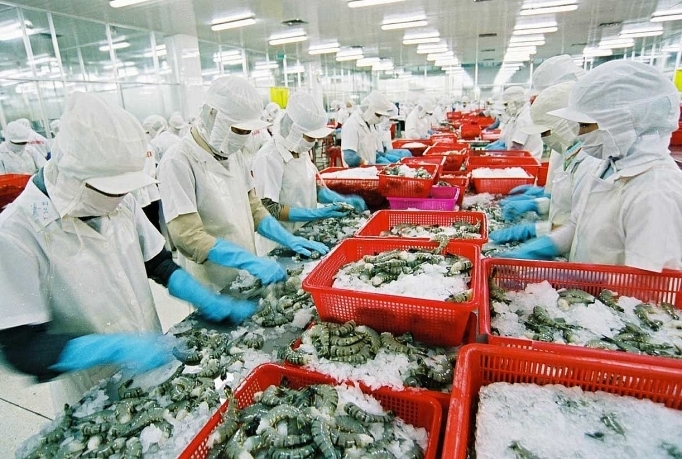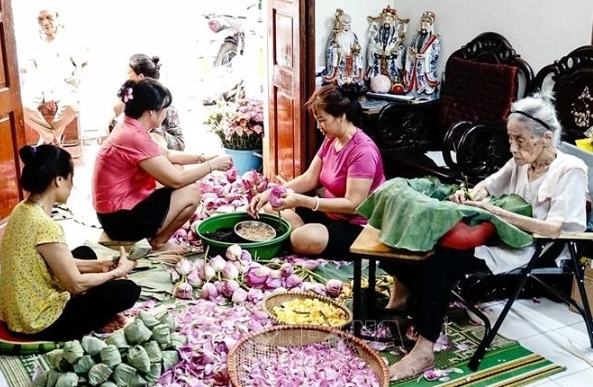Problems with aquatic raw materials to be reviewed and resolved
Wednesday, October 2,2024
AsemconnectVietnam - The regulation "Do not mix aquatic raw materials from imported exploitation with aquatic raw materials from domestic exploitation in the same export shipment" causes difficulties for businesses, the authorities said, and will review after the 5th inspection by the European Commission.
Problems arising from two decrees
On May 4, 2024, the Government issued Decree No. 37/2024/ND-CP amending and supplementing a number of articles of Decree No. 26/2019/ND-CP dated March 8, 2019 of the Government detailing a number of articles and measures to implement the Law on Fisheries (effective from May 19, 2024).
Previously, on April 5, 2024, the Government issued Decree No. 38/2024/ND-CP regulating administrative sanctions for violations in the fisheries sector.
When implementing the above two decrees, businesses said that they did not know how to correctly understand the concept of "mixing raw materials" in the same shipment. Because the above two decrees and the current Fisheries Law also do not have a specific definition of the act of "mixing raw materials".
In fact, for seafood businesses, producing finished products of a shipment with raw materials from many species, many items, from different sources such as exploitation and import is completely normal, a practice in current international trade. As long as the shipments are proven to not be illegally exploited, unreported and unregulated (IUU), are controlled, have traceable product origins and have sufficient necessary documents for export.
To demonstrate the inadequacies of this regulation, the Vietnam Association of Seafood Exporters and Producers (VASEP) provided evidence. Specifically, according to market demand, many seafood enterprises produce mixed goods or value-added products, such as "seafood skewers", in which a skewer includes both tuna and file fish (tuna is imported; file fish is purchased domestically). These raw materials are all non-IUU, traceable and have all necessary documents.
If the above regulation is implemented, enterprises are required to separate the fish pieces from the sticks; pieces of fish that are imported will be packed in a separate container; pieces of fish from domestic sources will be packed in another container, along with the number of sticks to skewer. When the separate containers reach the importing countries, customers must take the two types of fish themselves to skewer the sticks into the "seafood skewer" product according to the required specifications. This is difficult to implement.
Consider removing difficulties for businesses
Acknowledging the recommendations of businesses through VASEP, the Ministry of Agriculture and Rural Development has issued a response document stating that the two Decrees mentioned above have many new regulations, including regulations on the responsibilities of seafood importing businesses. Specifically, Clause 36, Article 1 of Decree No. 37/2024/ND-CP stipulates: “Do not mix imported seafood materials with domestic seafood materials in the same export shipment”;
Clause 4, Article 42 of Decree No. 38/2024/ND-CP stipulates: “Fine for the act of mixing seafood materials with domestic seafood materials and imported seafood materials into Vietnam for export to markets that require confirmation and certification of seafood from exploitation, etc”.
According to Deputy Minister Phung Duc Tien, the above regulations stem from the verification of violations regarding the origin of 7 tons of swordfish by enterprises, which the European Commission (EC) considers to be "fish laundering". Therefore, the new regulations in the two decrees are to ensure the control of imported raw materials, processing for export to Europe, and transparency in the origin of export shipments as required by the EC.
However, during the implementation process, VASEP member enterprises said that the above regulations caused some difficulties for enterprises. Noting this problem, the Ministry of Agriculture and Rural Development has directed specialized agencies under the Ministry to review the new regulations in the above decrees after the 5th inspection by the EC in October.
Accordingly, the content to be reviewed includes regulations on mixing raw materials and administrative sanctions for violations related to mixing raw materials and other related regulations. At the same time, strengthen the direction and urge localities to strictly implement the provisions of the Fisheries Law and newly issued guiding documents. The Ministry of Agriculture and Rural Development requests VASEP to continue to accompany and coordinate with the Ministry to perfect legal regulations, promote the production, business and export of aquatic products and join hands to soon remove the EC's yellow card warning.
CK
Source: VITIC/ haiquanonline.com.vn
Vietnam earned more than 822 million USD from cassava exports in 8 months
In the first 8 months of 2024, pepper exports to Germany increased by nearly 98% in volume
8 months of Vietnam's iron and steel exports earned more than 6.4 billion USD
Vietnam-US two-way trade approaches 90 billion USD mark
A leap in Vietnam's value-added pangasius exports
List of major soybean suppliers to Vietnam
Ho Chi Minh City aims to develop high-tech industries
Opportunities for the semiconductor industry
Machinery and equipment import markets in first 8 months of 2024
Vietnam's rice and fruit and vegetable exports in first 8 months of 2024
Vietnam's commodity export forecast for 2024
Exports of goods to Cambodia, Laos and Myanmar in 8 months of 2024
Positive signals in Vietnam's export and import of goods
Vietnam - Italy trade exchange in August and first 8 months of 2024

Plan of Hai Duong province for a period of 2021 - 2030, ...
Organize space reasonably and harmoniously, focusing on connecting Hai Duong in common development space, actively contributing to the ...Plan of Hau Giang province in a period of 2021 - 2030, ...
Sustainable forestry development program in a period of ...

Hanoi lotus-scented tea making craft listed among national ...
The Ministry of Culture, Sports, and Tourism has issued a decision recognising the traditional craft of making lotus-scented tea in Quang ...Vietnam festival helps tighten friendship with Japan
Vietnam to play friendly matches with Thailand and Russia ...



